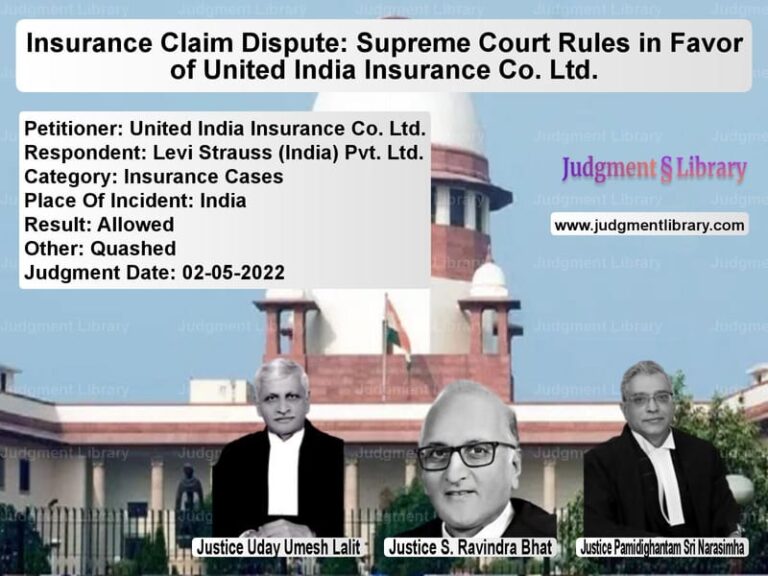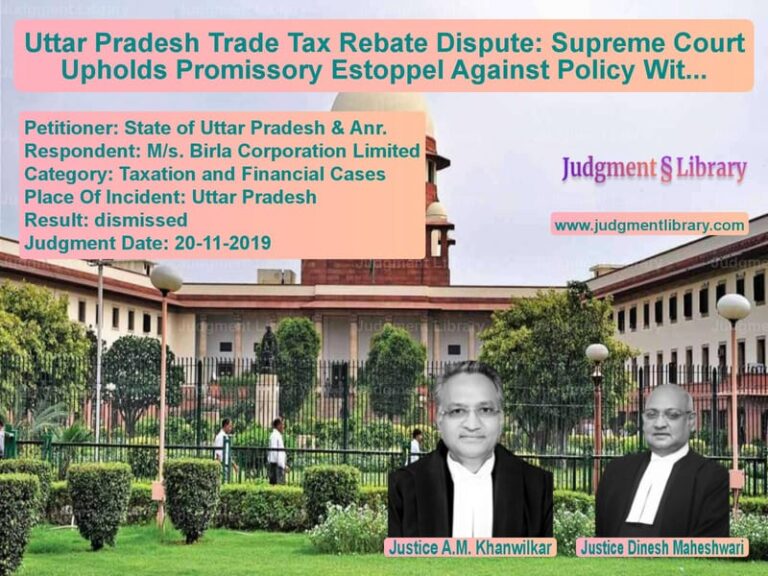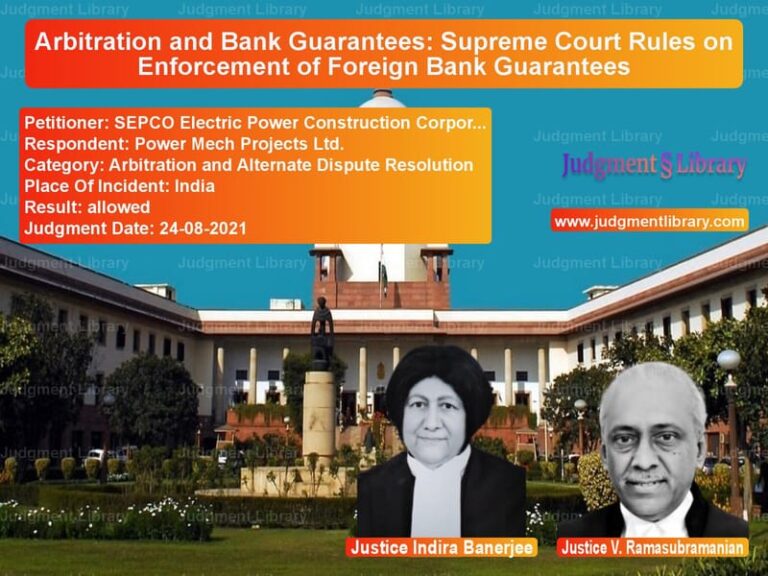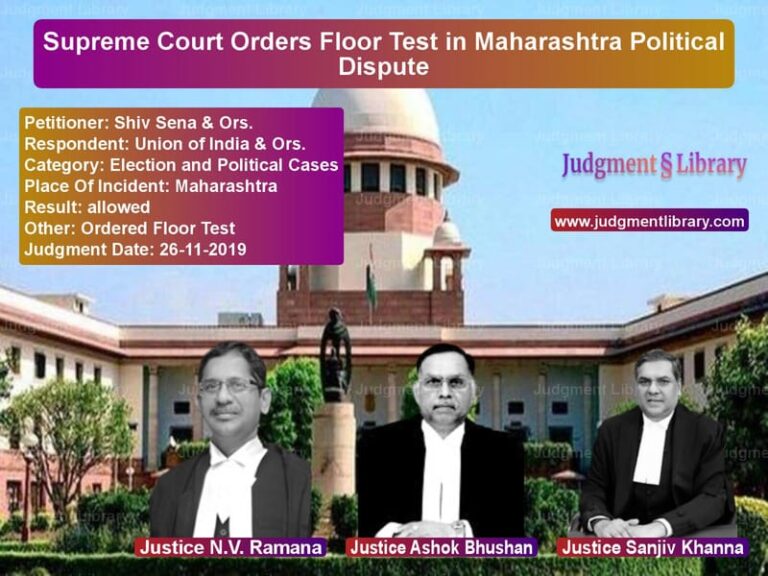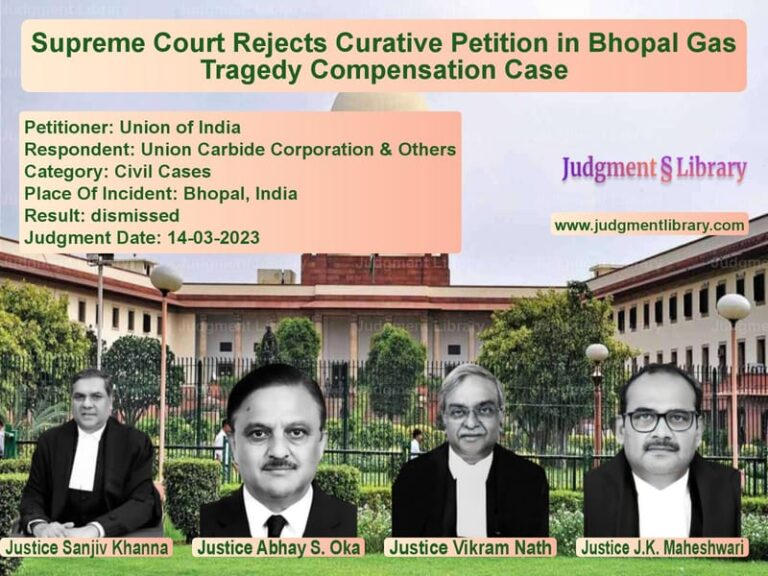Supreme Court’s Verdict on Arbitration in ONGC Mangalore vs. ANS Constructions: No Dues Certificate and Contractual Disputes
The Supreme Court of India, in the case of M/s ONGC Mangalore Petrochemicals Ltd. vs. M/s ANS Constructions Ltd. & Anr., delivered a significant ruling on the enforceability of a No Dues Certificate in contractual disputes and the invocation of arbitration clauses. The case revolved around whether a contractor, after signing a No Dues Certificate, could still claim arbitration and dispute contractual payments. The ruling provided crucial clarity on the doctrine of economic duress, the finality of contractual settlements, and the binding nature of arbitration agreements.
Background of the Dispute
The dispute arose out of an infrastructure contract awarded by ONGC Mangalore Petrochemicals Ltd. (hereafter ONGC Mangalore) to ANS Constructions Ltd.. The contract involved large-scale civil work, including site grading, construction of roads, drains, and a boundary wall in Mangalore Special Economic Zone. Initially valued at Rs. 163.25 crores, the contract value was subsequently revised to Rs. 195.68 crores.
While the project was completed within the stipulated time, disputes emerged concerning payments and additional costs incurred by the contractor. ANS Constructions claimed additional expenses due to delays caused by ONGC Mangalore. The contractor alleged that ONGC Mangalore delayed payments, forcing them into financial distress, and coerced them into signing a No Dues Certificate.
The Core Legal Issue
The primary question before the Supreme Court was whether a No Dues Certificate, once signed, could be challenged based on claims of coercion and whether arbitration could still be invoked despite the settlement document.
Arguments Presented
Petitioner’s (ONGC Mangalore) Arguments
- ANS Constructions voluntarily signed a No Dues Certificate on September 21, 2012, stating that all financial claims were settled.
- On October 10, 2012, ONGC Mangalore made the final payment of Rs. 20.34 crores, after which the contractor had no legal basis for raising further claims.
- Despite receiving full payment, ANS Constructions attempted to dispute the matter and invoke arbitration, which was not permissible under contract terms.
- The contract clearly stated that any claims must be settled before signing the final bill. Once the contractor signed the No Dues Certificate, no further claims could be entertained.
Respondent’s (ANS Constructions) Arguments
- The No Dues Certificate was obtained under economic duress, as ONGC Mangalore delayed payments deliberately.
- Payments under Running Account (RA) Bills were frequently withheld, leaving the contractor with severe cash flow issues.
- Additional costs were incurred due to site clearance delays, unforeseen regulatory changes, and approval issues, none of which were within the contractor’s control.
- Despite the No Dues Certificate, contractual arbitration clauses allowed disputes to be resolved through an arbitral tribunal.
Key Observations of the Supreme Court
The Supreme Court, comprising Justice R.K. Agrawal and Justice Amitava Roy, examined the following crucial issues:
1. Validity of the No Dues Certificate
The Court ruled that a No Dues Certificate signed voluntarily is legally binding. However, if obtained under coercion, it may be challenged. The judgment stated:
“When both parties confirm in writing that the contract has been fully discharged and there are no outstanding claims, subsequent disputes cannot be entertained unless coercion is established.”
2. The Doctrine of Economic Duress
The Court examined the claim of economic duress and ruled that financial hardship does not automatically invalidate a settlement:
“Economic duress must be proved with concrete evidence demonstrating that the party had no viable alternative but to sign under coercion.”
Since ANS Constructions continued contractual obligations for months and accepted payments, the claim of coercion was not sufficiently established.
3. Arbitration Clause and Its Applicability
The Court ruled that once a No Dues Certificate is signed, arbitration cannot be invoked unless the certificate is proven to be coerced:
“If a dispute exists regarding contract execution, the arbitration clause remains applicable unless a final settlement agreement was entered into voluntarily.”
4. The Final Decision of the Supreme Court
- The Court quashed the Karnataka High Court’s order appointing an arbitrator.
- The Court ruled that ANS Constructions failed to prove coercion in signing the No Dues Certificate.
- The arbitration request was dismissed, and ONGC Mangalore’s stance was upheld.
Impact of the Judgment
This ruling sets a strong precedent in contract law, particularly in large-scale infrastructure projects. It establishes that:
- Once a No Dues Certificate is signed voluntarily, it becomes legally binding.
- Claims of coercion must be substantiated with concrete evidence.
- Arbitration cannot be invoked post-settlement unless coercion is proven.
Conclusion
The Supreme Court’s ruling in ONGC Mangalore vs. ANS Constructions reinforces contractual finality and prevents frivolous disputes. By affirming the validity of No Dues Certificates and setting a high standard for proving economic duress, the judgment strengthens India’s arbitration framework and contractual enforcement mechanisms.
Petitioner Name: M/s ONGC Mangalore Petrochemicals Ltd.Respondent Name: M/s ANS Constructions Ltd. & Anr.Judgment By: Justice R.K. Agrawal, Justice Amitava RoyJudgment Date: 07-02-2018
Don’t miss out on the full details! Download the complete judgment in PDF format below and gain valuable insights instantly!
Download Judgment: Ms ONGC Mangalore P vs Ms ANS Construction Supreme Court of India Judgment Dated 07-02-2018.pdf
Direct Downlaod Judgment: Direct downlaod this Judgment
See all petitions in Arbitration Act
See all petitions in Contract Disputes
See all petitions in Enforcement of Awards
See all petitions in Judgment by R K Agrawal
See all petitions in Judgment by Amitava Roy
See all petitions in dismissed
See all petitions in Quashed
See all petitions in supreme court of India judgments February 2018
See all petitions in 2018 judgments
See all posts in Arbitration and Alternate Dispute Resolution Category
See all allowed petitions in Arbitration and Alternate Dispute Resolution Category
See all Dismissed petitions in Arbitration and Alternate Dispute Resolution Category
See all partially allowed petitions in Arbitration and Alternate Dispute Resolution Category



